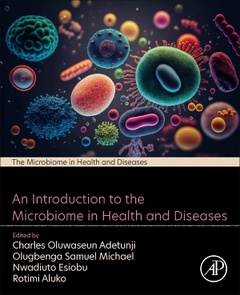Description
An Introduction to the Microbiome in Health and Diseases
THE MICROBIOME IN HEALTH AND DISEASES Series
Coordinators: Adetunji Charles Oluwaseun, Michael Olugbenga Samuel, Esiobu N., Aluko Rotimi E.
Language: English
Subject for An Introduction to the Microbiome in Health and Diseases:
246 p. · 15.2x22.8 cm · Paperback
Description
/li>Contents
/li>Biography
/li>Comment
/li>
This introductory volume offers an overview on the microbiome and explores the role of the human microbiome in health and disease outcomes. It examines the compositional structure and molecular approaches to microbiome characterization and identification. Additional coverage also includes an introduction to animal microbiomes, plant microbiomes, epigenetic programming, gut microbiota and the impact of diet and exercise, as well as the relationship between the microbiome and COVID-19.
Chapter 1 Microbiome: Introduction and Recent Advances
Chapter 2 Why the Need for Microbiome? An Updated Perspective
Chapter 3 Procedures for Sampling of Small and Larger Samples of the Microbiome
Chapter 4 Microbiome Characterization and Identification: Key Emphasis on Molecular Approaches
Chapter 5 COVID-19 and the Microbiome
Chapter 6 Introduction to Plant Microbiomes
Chapter 7 Introduction to Animal Microbiomes
Chapter 8 Patents, Bioproducts, Commercialization, and the Social, Ethical and Economic Implications of Microbiome
Chapter 9 Introduction to Gut Microbiome and Epigenetics: Their Involvement in Polycystic Ovary Syndrome Pathogenesis
Chapter 10 Introduction to Epigenetic Programming by Gut Microbiota
Chapter 11 Gut Microbiota, Nutrition, and Health: Fundamental and Basic Principles
health and microbiome will be addressed
Prof. Charles Oluwaseun Adetunji is a full Professor at the Department of Microbiology, Faculty of Sciences and the Director of Research and Innovation, Edo State University Uzairue (EDSU), Edo State, Nigeria. He formerly served as the Acting Director of Intellectual Property and Technology Transfer, Head of the Department of Microbiology, and Sub Dean of the Faculty of Science. Currently, he holds the positions of Chairman of the Grant Committee and Dean of the Faculty of Science at EDSU.
Prof. Adetunji is a Fellow of the Royal Society of Biology in the UK. Additionally, he serves as a Visiting Professor and the Executive Director of the Center for Biotechnology at Precious Cornerstone University, Nigeria. His research centers on applying biological techniques and microbial bioprocesses to achieve Sustainable Development Goals (SDGs) and contribute to advancements in agriculture.
Olugbenga Samuel Michael, Ph.D, is a faculty at the Department of Physiology, Faculty of Basic Medical and Health Sciences, College of Health Sciences, Bowen University, Iwo, Osun State, Nigeria. His research interest over the years has focused on the cardiometabolic interactions that affect physiological processes in the body. His work on cardiovascular, renal and hepatic metabolic dysregulation in metabolic syndrome has made significant contribution to ongoing investigations to provide therapeutics for the management of metabolic syndrome. Microbiome research and its application in health and disease especially its involvement in the pathogenesis or management of cardiometabolic disorders, non-alcoholic fatty liver diseases, polycystic ovary syndrome has been one of his research interests. Furthermore, He explored the use and understanding of the mechanism of plant phytochemicals, nutraceuticals, pharmafoods and diets for the treatment of diseases. He has published several scientific journals and conference proceedings in local and international journals. He is a member
- Provides fundamental coverage on the microbiome and its effect on human health and diseases.
- Describes procedures for sampling small and larger samples of the microbiome.
- Discusses patents, bioproducts, commercialization, and the social, ethical and economic implications of the microbiome.




